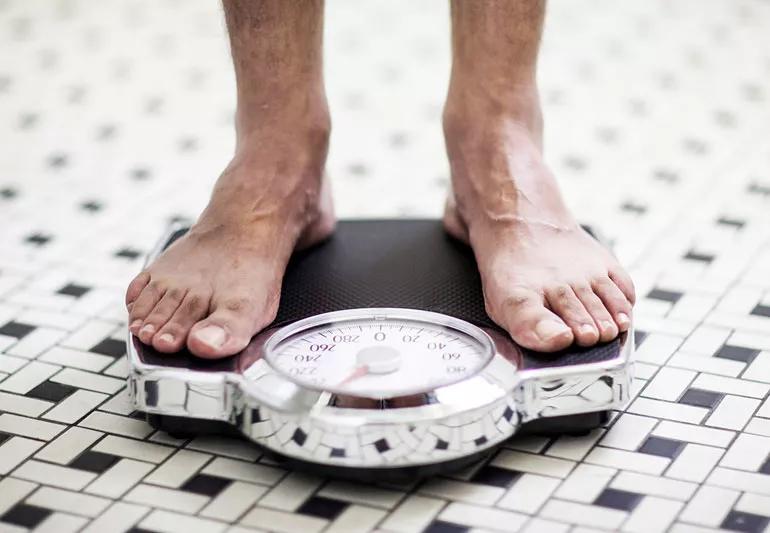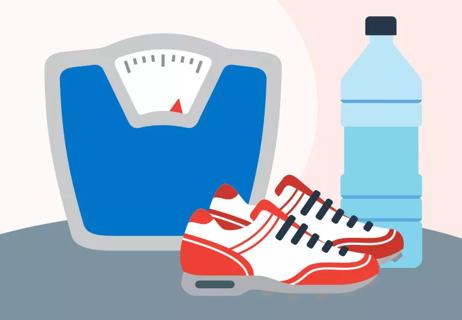Consistency is a big part of weight tracking

Trying to lose weight is more than just a numbers game — it’s also about making sure you’re keyed in to making healthy life choices, like getting good nutrients and being physically active at least five days a week.
Advertisement
Cleveland Clinic is a non-profit academic medical center. Advertising on our site helps support our mission. We do not endorse non-Cleveland Clinic products or services. Policy
But if the number on the scale is still important to you, or if you need just a little bit of motivation, keeping an eye on your weight could be helpful in your healthy lifestyle journey.
But how should you approach it?
Consistency is key, says registered dietitian Maxine Smith, RD, LD — that’s perhaps one of the most important things related to weight management.
Here, Smith sheds some light on how you can make your scale work for your own personal goals, as well as other behavioral changes you can make that lead to more positive outcomes in the long run.
The best time to weigh yourself is first thing in the morning after you’ve gone to the restroom but before you eat or drink anything. The reason for this is that your body has had enough time to digest all the food and drinks you’ve consumed from the day before all while you were getting your beauty sleep.
When you weigh yourself in the morning, you want to wear as little clothing as possible, or at least wear the same items whenever you step on the scale.
Several studies show that weighing yourself on a regular basis leads to the greatest changes in weight. Some people like to weigh themselves one day a week, while others like to weigh themselves every morning. How often you prefer to weigh yourself is entirely up to you. Just be consistent.
Advertisement
A 2019 study suggests daily measurements lead to greater weight loss when compared with groups of people who have less frequent patterns. And the scale on the floor isn’t the only measuring tool available to you.
A 2021 study indicates that the use of digital self-monitoring systems (like smartwatches, fitness apps and website trackers) were associated with greater weight loss when compared to pen-and-paper tracking, while a 2018 study suggests short-term use of activity trackers can be more beneficial than a standard weight loss program.
In fact, according to a 2017 study that looked at the contribution that self-monitoring made to weight loss, more positive outcomes occur when there’s a combination of consistent behaviors, like weighing yourself regularly, logging your nutrition and having a minimum of 60 highly active minutes per week.
All of these studies suggest that if you remain consistent in how you weigh yourself, you have a greater chance of making positive changes in what you eat, how often you eat and how active you are over time. All of this may be due to the simple idea of holding yourself accountable to a regular routine.
“Regularly weighing yourself can help you stay on track with your weight loss or weight management goals,” reiterates Smith. “It’s like having a weekly budget. If you go over your budget one week, you want to know so you can fix it. If you don’t realize you’re overspending every week, it adds up.”
If you choose to weigh yourself on a daily basis, make sure you’re weighing yourself at the same time every day and wearing the same clothing or nothing at all, and that you’re using the same scale every time. If you choose to weigh yourself once a week, that’s OK, too. Just make sure you try and weigh yourself on the same or similar days — meaning every week on a Wednesday for example, instead of on a Friday and Monday.
“Many people have a different routine on the weekends,” notes Smith. “They might eat out more, drink alcohol or snack more. Compare a Monday to a Friday, where you’ve had four or five days of consistent activities and eating patterns, and you’ll see a big difference between the two days.”
It’s also important to note that for some people, keeping such a close eye on those numbers might not be the best thing. A 2020 study suggests the largest barrier to self-monitored weight management was a misunderstanding of day-to-day fluctuations in your weight, not being able to see the bigger picture of how your weight changes over time and forgetting to take measurements consistently.
“Keep in mind that your weight reflects changes in your body fat, but also changes in your muscle and water retention,” explains Smith.
Advertisement
“For example, if you start exercising more, your weight might go up because you are gaining muscle which is a good thing! The amount of salt or carbohydrate that you have been eating can also affect how much fluid weight you have, as well as some medications.”
Expecting your weight to vary a pound or two from day to day — despite the calories that you ate or burned the day before — is realistic and healthy. And if you have a history of eating disorders or have any anxiety about stepping onto the scale, avoiding those numbers and talking to a behavioral health specialist can be helpful. The most important thing on any healthy living journey is to find out which routines work best for you and to make sure your routine isn’t getting in the way of any positive progress.
“The scale serves as a measurement tool to encourage exploration into your behavior and choices,” states Smith. “At all costs, avoid judging yourself based on a number. Instead, set behavior change goals that are small, realistic and that you can measure over a set period of time. This is something that you do have control over. So, be sure to give yourself grace. Making progress, not meeting goals perfectly, is a victory.”
Advertisement
Some say the best day of the week to weigh yourself is on a Wednesday because the middle of the week is a good halfway point to see where you stand and how you can adjust accordingly. But Smith says you’re not tied to any one day, and that weighing yourself on a Friday may be a better option.
“Many people like to see what they weigh on Friday because they’ve had a consistent routine throughout the week,” she explains. “You see where your weight is after you’ve held a routine for five days. Then, you can adjust your routine if you need to.”
Keep in mind that sudden changes in your weight aren’t always possible. It’s common for your weight to fluctuate within a 5-pound range. But if you’ve gained weight “overnight” and feel bloated, it might be from retaining water because of:
Constipation can also add to increased sudden weight gain. But if you’re retaining water for no obvious reason, you should speak to a healthcare provider.
Remember, as long as you’re consistent, you can’t go too wrong in weighing yourself by following these easy steps:
Advertisement
Your weight isn’t the most important thing when it comes to your overall health, but it is a small piece of the puzzle.
“During any health journey, there’s more than one way to measure success,” Smith encourages. “The scale is just one factor, and it isn’t going to reflect all the positive changes you make.”
Other measurements of success include acknowledging healthier food choices and focusing on the mental and physical benefits of regular exercise.
“Maybe your favorite pair of jeans fit better, even though you haven’t lost much weight, or maybe you have more energy to play with your kids,” says Smith. “So many victories are not scale-related.”
Learn more about our editorial process.
Advertisement

No one diet is right for everyone — but the Cleveland Clinic Diet app meets your personalized needs

Constantly thinking about food can make it hard to maintain a healthy weight and can lead to other health issues

Hormones, water retention and even exercise can play a part in daily weight changes

Having obesity brings long-term health risks no matter your fitness level

Maintaining a healthy weight, focusing on exercise and eating a well-balanced diet can improve your overall metabolic health

Overweight and obesity increase your CKD risk, and may speed disease progression in people who have the condition

There’s no set timeline, as factors like dosage, diet, exercise and stress levels can impact the effectiveness of the medication

It depends on factors like your age, activity level and if you want to maintain, lose or gain weight

Wearing a scarf, adjusting your outdoor activities and following your asthma treatment plan can help limit breathing problems

Your diet in the weeks, days and hours ahead of your race can power you to the finish line

When someone guilt trips you, they’re using emotionally manipulative behavior to try to get you to act a certain way